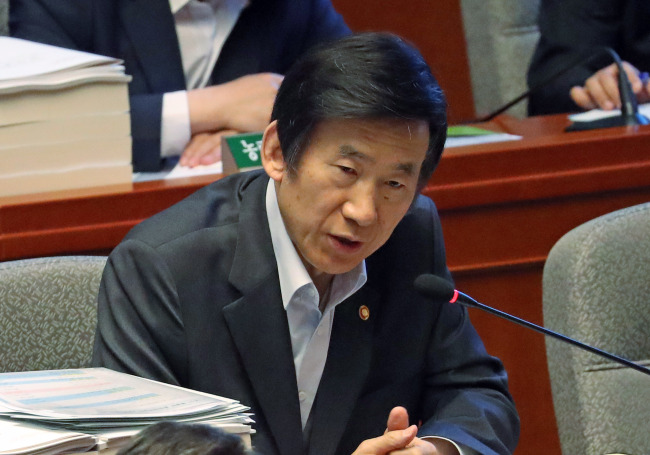In the aftermath of the Hague tribunal’s ruling on the South China Sea, Seoul’s dilemma is poised to deepen as the U.S. will likely call for its ally to speak up on Beijing’s assertiveness in the region in pursuit of joint action, observers here said Wednesday.
The watershed findings announced Tuesday dealt a major blow to China. The tribunal rebuked Beijing’s claim to “historic rights” over the bulk of the resources-rich waters as lacking legal basis and said some of its activities breached the Philippines’ sovereign rights.
Washington, which has been locking horns with Beijing over its expansive sovereignty claims, including the construction of artificial islands there, welcomed the decision. It cautioned China to abide by global norms or risk being branded as an outlaw.
The watershed findings announced Tuesday dealt a major blow to China. The tribunal rebuked Beijing’s claim to “historic rights” over the bulk of the resources-rich waters as lacking legal basis and said some of its activities breached the Philippines’ sovereign rights.
Washington, which has been locking horns with Beijing over its expansive sovereignty claims, including the construction of artificial islands there, welcomed the decision. It cautioned China to abide by global norms or risk being branded as an outlaw.

South Korea’s Foreign Ministry issued a brief statement on Wednesday, saying it “paid attention” to the ruling. It expressed hope for a resolution of the dispute through “peaceful and creative diplomatic efforts.”
The statement carried a much more reserved stance compared with that of Japan, which said it “strongly expects the parties’ compliance with the ruling.” Tokyo and Beijing are also at odds over some islands in the East China Sea.
“Our government has maintained that peace, stability and freedom of navigation and flight must be ensured in the South China Sea, a major international maritime traffic route, and the dispute should be resolved according to related agreements, nonmilitarization pledges and internationally established codes of conduct,” the Seoul ministry said.
Tension could escalate further if Beijing takes additional military steps, such as setting up an air defense zone over the sea, which could prompt Washington to engage a show of force by sending warships, patrol planes or other assets.
In a more pessimistic scenario, China may opt to become the first country to bow out from the 168-party U.N. Convention on the Law of the Sea. But it would be deprived of other rights as a result, such as those concerning Beijing’s continental shelf claims in the East China Sea, according to Lee Ki-beom, a research fellow at the private Asan Institute for Policy Studies in Seoul.
Chinese Vice Foreign Minister Liu Zhenmin suggested Wednesday that the air defense zone could be an option and said the decision “depends on the level of threats” the country faced.
To Seoul, this would mean an intensifying dilemma between its traditional ally and an increasingly interdependent neighbor.
With its strategic rebalancing toward the Asia-Pacific, the U.S. has repeatedly been raising the need for South Korea to step up its response to China’s assertive push in the region.
U.S. President Barack Obama said after his summit with President Park Geun-hye last October in Washington that he expects Seoul to “speak out just as we do” when China fails to follow international norms and rules.
Shortly before the talks, Assistant Secretary of State for East Asia and Pacific Affairs Daniel Russel had also said, “It is a good thing for the leaders of China to hear directly from another democratically -- from a democratically elected president in a neighboring country” regarding freedom of navigation and commerce.
“Now that the areas surrounding low-tide elevations have been ruled as international waters, the U.S. may seek joint patrol operations with its allies -- most likely Japan, Australia and South Korea,” Lee of Asan said.
“While Japan and Australia would willingly take part, Seoul would have to come up with legitimate reasons to refuse the request or join for a few hours when its ship returns from the Gulf of Aden as an ally’s gesture. It will take political judgment.”
The friction could rekindle as leaders from across the region gather in Mongolia later this week for the Asia-Europe Meeting summit, including Park, Chinese Premier Li Keqiang and Japanese Prime Minister Shinzo Abe.
The issue is forecast to top the agenda for the ASEAN Regional Forum scheduled for the last week of July in Laos. Hosted by the 10-member Association of Southeast Asian Nations, the region’s largest security conference has in recent years been eclipsed by the sovereignty feuds in the South China Sea, failing to release a joint communique in 2012 for the first time since the grouping’s 1967 founding.
“Though we need to do in-depth analysis on its implications, the Hague verdict will not likely bring about a major change in our position toward the issue, and we will continue to respond based on that,” a Foreign Ministry official here said, requesting anonymity wary of the sensitivity of the matter.
By Shin Hyon-hee (heeshin@heraldcorp.com)


















![[Today’s K-pop] Treasure to publish magazine for debut anniversary](http://res.heraldm.com/phpwas/restmb_idxmake.php?idx=642&simg=/content/image/2024/07/26/20240726050551_0.jpg&u=)